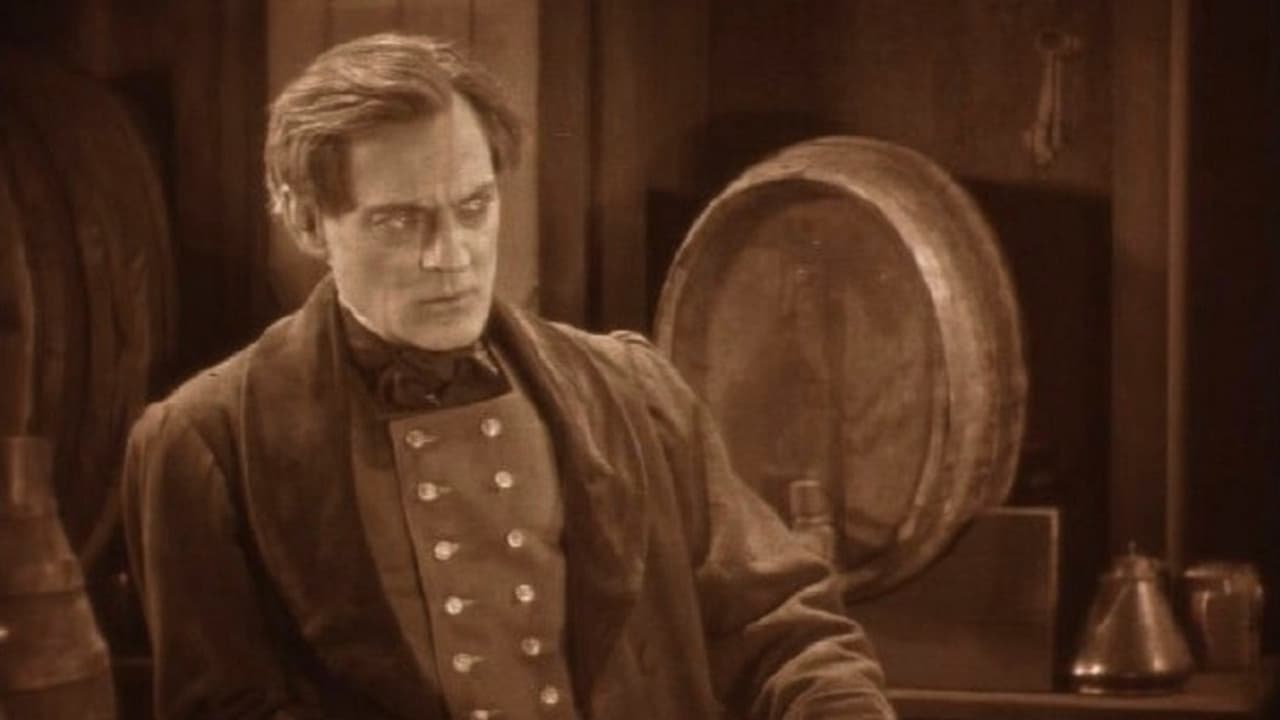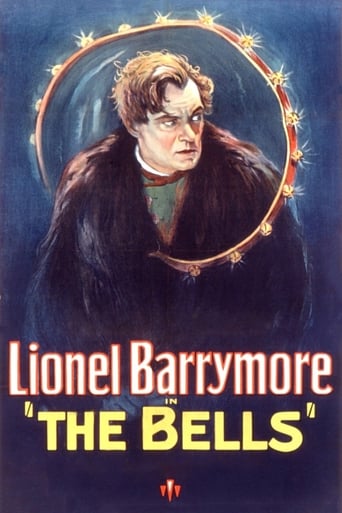lugonian
THE BELLS (Chadwick Studios, 1926), Adapted and Directed by James Young, is not credited as a story taken from an Edgar Allan Poe poem but from a play "The Polish Jew" by Erckmann-Chatrain. Starring Lionel Barrymore, THE BELLS is most notable for an early silent film appearance of Boris Karloff, years before his great popularity in the horror genre. Interestingly, his performance here might have set the pattern to his future film roles of that time, but it would be years before achieving his triumph starting playing the Monster in FRANKENSTEIN (Universal, 1931).Opening title: "The scene of 'The Bells' is laid in Alsatia, in a Hamlet at the foot of Mount Snowtop, during the great snow storm of Christmas 1868. Several versions of that classic of the theater has been presented during the last half century, the most notable performance of the play was that of the late Sir Henry Irving." Mathias (Lionel Barrymore) is the owner of the inn and village mill. His ambition is to be a burgomaster. Mathias has a wife, Catherine (Caroline Francis Cooke) and a beautiful young daughter, Annette (Lola Todd). Because Mathias has a habit of giving credit to his friends and patrons is the reason why he hasn't any money. He is in debt with Jerome Franz (Gustav Von Seyffertitz), who intends on taking over his inn if he is not paid. Franz is willing to overlook his debt if Mathias offers his daughter for his hand in marriage, but refuses. Annette is in love with Christian (Edward Phillips), an appointed handsome gendarme. During a carnival, Mathias witnesses a Mesmerist (Boris Karloff) raising a young girl into the air, followed by making a man's hat float above his head. The Mesmerist senses Mathias a skeptic and asks to hypnotize him, but declines. Mathias goes to a fortune teller (Laura Lavarnie) instead, who sees something into Mathias' future that she refuses to reveal. During a Christmas party, Baruch Koweski (E. Alyn Warren), a traveling merchant and Polish Jew on his way to Warsaw, stops in from the heavy snowstorm for the night. When Mathias sees he has gold in his money belt, the desperate Mathias follows him outside in the snow to kill him with the ax and steal his gold. Some time later, after Mathias is named Burgomaster, Jethro (E. Alyn Warren), the victim's brother, arrives asking the new Burgomaster to assist him in finding his brother's killer, but Mathias has problems of his own, including those sinister eyes of the Mesmerist watching him fight with his very own conscience having sounds of sleigh bells constantly ringing inside his head. How much more torment will Mathias have to endure?Except for the title, this edition of THE BELLS is a sort of story that could or might have been adapted by Edgar Allan Poe. It has the ingredients of Poe such as the ghost of the murder victim appearing to his killer, and the evil looking Karloff (18 minutes into the start of the movie) to add to the chills. However, this is very much Lionel Barrymore's film as a tortured soul fighting his own conscience. Yet the sinister looking Karloff, in wavy hair, dark glasses, top hat and cloak, nearly steals the show. Another interesting aspect to THE BELLS is seeing the same supporting players of Gustav Von Seyffertitz, Lorimer Johnston and Caroline Francis Cooke all later listed in the cast in minor roles of Boris Karloff's third installment of SON OF FRANKENSTEIN (Universal, 1939). The lesser known actress of Lola Todd in THE BELLS somewhat resembles that of Mary Philbin's character in THE PHANTOM OF THE OPERA (Universal, 1925) starring Lon Chaney, while Edward Phillips assumes his role well as the typical handsome love interest.Though there have been no known television broadcasts of THE BELLS (at least to the best of my knowledge), this very rare silent film indeed has fortunately survived after all these years, especially for being an independent feature film. It has become released on DVD in 1998, accompanied by some Gothic sounding musical score conducted by Eric Belheim and the William Platt Players, that could either please or be dissatisfying to the ears. Either way, no harm done for 69 minutes. Basically a curiosity for Karloff fans, if nothing else. (*** Bells)
utgard14
Neat little silent movie starring Lionel Barrymore as an innkeeper with debts that endanger his political aspirations. So he murders a wealthy traveler to get the money to pay off the debts. At first things are fine but soon his victim's brother shows up and guilt begins to overtake him. Tell-tale heart (or rather, bells), here we come. Barrymore, as always, is great. Any hamminess can be forgiven due to the style of the silent era. Boris Karloff plays a creepy-looking mesmerist (hypnotist) who plays a part in Barrymore's ultimate fate. A good picture that should please most Barrymore fans and give Karloff fans a little something interesting, too. The hallucination sequence is the highlight. My only complaint is that the boisterous music score that accompanies the version I watched doesn't fit the action on screen half the time. But I won't hold that against the film as I'm not sure if this was the original music meant to accompany the film or if it's just one of many and possibly a modern add-on. It might give you a headache, though, so watch out.
jldmp1
My objection to this is not with the story itself, but with the absolute paucity of imagination involved in converting this from play to film.You can easily count the cinematic moments - the bloody hands, the filter color changes to denote Barrymore's state of mind, the ghostly split-screen compositions...they seem to distract from the 'play' more than they amplify any notions that this is supposed to be a movie. The ideas are not worth studying or seeking out.I don't give this my lowest rating, which I reserve for those movies that offend in some way. At worst, this is ineffectual.
Ryan Louis
After reading the Edgar Allen Poe poem, this film seems like an adequate representation of its original moods and feelings. Plus, you've got great talents like Lionel Barrymore and Boris Karloff (even though he has a small role) moving this picture down its macarbe path. So, if you enjoy silent films, this one will probably float your boat. The only complaint I have is in the the 1998 release's choice of music. It seems overly cheesy to be associated with Edgar Allen Poe. Although, the use of silence and sleigh bells adds a lot to the impact of the film. Intriguing with a good pace (plus, it's only 67 minutes, so if you can't sit through long silent films like "Birth of a Nation," then this one is for you.).

